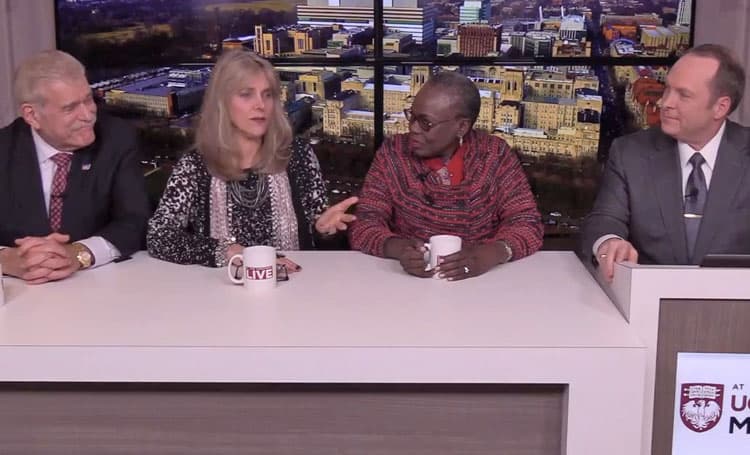The University of Chicago Medicine honors breast cancer specialist Laura Esserman

Michelle M. Le Beau, PhD, director of the UChicago Medicine Comprehensive Cancer Center (left), presents Laura Esserman, MD, MBA, professor of radiology and surgery at UCSF Helen Diller Comprehensive Cancer Center, with the 2019 Simon M. Shubitz Prize. Esserman accepted the honor and delivered a lecture at UChicago on Monday, Oct. 14, 2019. Photo credit: John Kilkus
Breast cancer specialist Simon M. Shubitz Prize for Excellence in Cancer Research is presented annually to a physician or scientist who has made significant contributions to the study of cancer. It was established in 1978 by Simon M. Shubitz, MD, a distinguished alumnus of the University of Chicago known for his dedication as a physician and his efforts as a humanitarian and philanthropist.
Esserman, an internationally recognized leader in the field of breast cancer care and research, received the award and delivered a lecture, "Transformation in Trials and Care to Accelerate Learning in Medicine," on Oct. 14, 2019, at the University of Chicago.
“I am deeply honored to receive the prestigious Shubitz Cancer Prize and Lectureship,” Esserman said. “My work is dedicated to accelerating the development of targeted, effective prevention and treatment options because patients don’t have 10 years to wait for the right treatment options.”
Esserman is a Professor of Surgery and Radiology at the University of California, San Francisco (UCSF) Olufunmilayo Olopade, MD and Deepa Sheth, MD.
Over her impressive career, Dr. Esserman has worked tirelessly to revolutionize breast cancer screening and treatment and continues to lead the field forward in innovative ways.
Breast Cancer Screening - Annual vs Personalized

